- Home
- Mark Frost
The List of Seven Page 15
The List of Seven Read online
Page 15
“Mind your words carefully—”
“You’re fucking her, aren’t you, don’t try to deny it—”
“Put that gun down, you stupid boy!” shouted Sparks with ringing authority, without moving a muscle. “Put it down this instant!”
Nicholson froze like a dog hearing a whistle above the range of human hearing. The twisted smile melted off his face, revealing the bereft, self-pitying mask of an unloved child. He lowered the gun.
“Now, young man, you will answer properly when you’re spoken to,” Sparks said.
“I’m sorry,” whimpered Nicholson.
Sparks rose quickly, snatched the gun from Nicholson’s hand, and slapped him twice, hard, across the face. Nicholson crumpled to his knees and began to weep like a baby. Sparks emptied the chambers of the pistol, pocketed the shells, and tossed the gun to the floor. He grabbed Nicholson by the lapels and pulled him roughly to his feet.
“If you ever speak rudely to me again,” Sparks said intently, “or speak of your wife rudely, or make any more crude remarks on any subject whatsoever while in my presence, you will be very severely punished. Do I make myself clear, boy?”
“You can’t speak to me that way!” Nicholson sniveled. Sparks shoved him back into a chair, where he landed with a startled cry. His red weeping eyes were fixed on Sparks, who picked up his walking stick and advanced on him.
“You are a mean and wicked child—”
“I’m not either!”
“Hold out your hands, Charles.”
“You can’t make me—”
“Hold them out this instant.”
Whimpers bubbling from his lips, Charles offered up his trembling hands, palms raised.
“How many does our naughty boy here deserve, Gompertz?” Sparks asked Doyle, flexing the stick in his hands.
“I should give him one more chance to be cooperative, sir, before administering any reinforcement,” Doyle said, not bothering to quell his revulsion at Nicholson’s utter collapse.
“Right. Did you hear Gompertz, Charles? He’s suggesting I be merciful. Do you think that’s a very good idea?”
“Y-y-y-yes, sir.”
Sparks whacked him heavily across the palms. Nicholson howled.
“Where is your wife?” Sparks asked.
“I don’t know—”
Sparks hit him again.
“Ahh! London, London, I think. I haven’t seen her in three months.”
“Where is your son?”
“She took him,” said Nicholson, sobbing, tears and snot running freely down his face.
“Have you seen your son since?”
“No, I swear!”
“Why did you build the wall, Charley?”
“Because of her.”
“Because of your wife?”
“Yes.”
“Did you build it after she left?”
Nicholson nodded.
Sparks raised the cane. “Why?”
“Because I’m afraid of her.”
The cane crashed down on Nicholson’s hands again. “You are a very obstinate boy: Why are you afraid of your wife, Charley?”
“Because… she worships Satan.”
“You’re afraid of her because she worships Satan?”
“She worships Satan, and she consorts with devils.” Sparks hit him hard again across the palms. “It’s true, it’s true, I swear to Jesus it’s true,” Nicholson cried out miserably. His ability to offer continued resistance was absolutely shattered. Doyle could see that Sparks realized it; he leaned down beside Nicholson now, his voice boring into him like a drill bit.
“What does your wife do that makes you so afraid?”
“She makes the bad things come.”
“What bad things are those, Charley?”
“The things that come at night.”
“Is that why you built the wall, Charley? To keep the bad things out?”
“Yes.”
“Is that what all the salt is for?”
“Yes, yes. It hurts them.”
“What kind of things are they?”
“I don’t know, I’ve never seen them—”
“But you’ve heard them, haven’t you, at night?”
“Yes. Please don’t hurt me anymore, I’m begging you,” Nicholson groveled, trying to wrap himself around Sparks’s boot.
“You sold some land of yours last year, Charley. Quite a lot of land, do you remember that?” said Sparks, kicking him away. “Answer me!”
“I don’t remember—”
“Listen to me: You sold some land in the north that was deeded to you; it belonged to your family. You sold it to a man: General Drummond.”
“The General?” Nicholson looked up, stupid and grateful at the sound of something familiar.
“Do you remember, Charley? Do you remember the General?”
“The General came here. He came with my wife.”
“The General is a friend of your wife’s, is he?”
“Yes, yes, they’re good friends. The General’s a nice man. He brings me sweets and caramels. He brought me a pony once. A dappled gray. I named him Wellington,” Nicholson babbled, retreating further into childhood. Whatever starch had kept his adult personality intact throughout the siege of Topping evaporated before their eyes.
“He made you sign some things, didn’t he, Charley, the last time the General was here. Legal documents. Some pieces of paper.”
“Yes, so many, so many papers. They said I had to sign, or he’d take away my pony,” he said, beginning to cry again.
“And immediately after you signed these papers, that’s when your wife left you, isn’t it? She left with the General?”
“Yes, sir.”
“And she took your son with her, didn’t she?”
“Y-y-yes, sir.”
“How long were you married?”
“Four years.”
“Did she live here with you at Topping that entire time?”
“No. She came and went.”
“Where did she go?”
“She never told me.”
“What did your wife do before you married her?”
Nicholson shook his head, drawing an honest blank.
“Did she ever tell you anything about her family?”
“She said her family owned a…publishing company.”
“In London?” Doyle asked involuntarily.
“Yes, in London,” said Nicholson, now indiscriminately servile.
“Where in London, Charley?” said Sparks.
“I went there once. Across from the big museum—”
“Russell Street?”
Nicholson nodded. There was a loud hammering at the door.
“Out the window,” shouted Barry from the hallway.
From somewhere below, they heard the sound of breaking glass. Sparks moved to the window and drew the curtain. Doyle joined him.
The figure in black from the inn at Cambridge was moving across the courtyard toward the front door, a half-dozen gray hoods fanning out across the grounds behind him.
“More of them this time,” said Sparks calmly.
“Is it her?” cried Nicholson in terror. “It is, isn’t it? She’s come for me!”
“We’re going to leave you now, Charles,” said Sparks, not without some kindness. “Load your gun, lock the door after us, don’t open it for anyone, and happy New Year to you.”
Sparks tossed the bullets toward Nicholson and stepped rapidly to the door, Working together, Sparks and Doyle had the locks undone in moments, and they moved out to join Barry in the hall. Doyle’s last glimpse before Barry pulled the door shut behind them was of Lord Nicholson keening hysterically, scrambling on his hands and knees trying to gather up the scattered bullets.
“Brought in the bags,” Barry said as they ran down the hall. “Went back to feed the horses; that bleedin’ growler’s flyin’ hell-bent down the lane.”
“All the exits blocked?” Sparks said, drawing out his blade.
“Yeh. We’ve lost the coach. More of them hoods this go-around.”
“Did you manage to open that door in the pantry?”
“I’ve had me hands full, haven’t I?” said Barry, showing a bit of crust.
“Quickly, Barry, they won’t be long getting in.”
“Shouldn’t we bring Lord Nicholson?” asked Doyle.
“He’s done enough damage.”
“But they’ll kill him—”
“He’s past redemption.”
They ran down the stairs and through the great hall. A heavy pounding began at the door. Windows shattered all along the front wall; an arm groped through an opening, hand looking for a latch. Barry led them away, through a knotted sequence of rooms to the kitchen and into the adjacent larder.
“Watch this,” said Barry.
Barry pulled a sack of flour off a shelf in the larder; the opposite wall rose up and disappeared into the ceiling like a sash-weighted window, revealing behind it the mysterious door he’d described.
“Ingenious,” said Sparks. “My compliments to the architect.”
“Got a lock on it you won’t find in some banks,” said Barry, as he unfolded a cache of his tools and went to work on the formidable padlock.
A crash from somewhere deep in the house announced the invaders had breached the outer fortifications.
“Give me a hand here, Doyle,” said Sparks, pushing a table against the kitchen door. They piled the rest of the room’s furniture on top of the table, readied their weapons, and waited for Barry to punch through.
“What’s your diagnosis of the woeful Charley?” asked Sparks.
“Incipient madness. Probably tertiary syphilis,” said Doyle.
“Dead from the neck up. More holes in his brain than a beehive.”
They heard hurried, muffled footsteps on the stairs and floors above. The thwack of Barry driving a spike into the lock resounded in that small space like a gunshot.”
“Easy on, Barry.”
“I’d use a blancmange, but I don’t fink it would have the same effect,” said Barry, annoyed.
“Thank you, Barry,” said Sparks, batting back the sarcasm.
“I wish he’d remembered the name of that publishing house,” Doyle said.
“We’ll find it easily enough. Provided we make it back to London alive—how’s it coming, Barry?”
“Have it off in a pig’s whisper.”
“Even allowing for the delusions common to his illness, it appears Lady Nicholson wasn’t quite the innocent we took her for,” admitted Doyle.
“Women seldom are.”
Barry broke through the lock and pushed open the door. The smell that greeted them on the wind that rose from below was dank, ageless, and as stale as the grave. Sparks took the lead, and they went down the first few steps. Carved right out of the earth, they were steep, slippery with moss, and crudely crafted. The light from the kitchen penetrated only a short distance beyond where they stood before the steps disappeared into Stygian blackness.
“Got a lantern here,” said Barry, plucking an oil lamp off a hook on the earthen wall. He struck a match and lit the wick; its pale amber glow plowed only a small dent in the subterranean murk. Sparks took the lantern and started down.
“Mind your step. It’s slick as ice,” said Sparks.
“Pull that knob by the jamb, if you’d be so kind, guv,” requested Barry.
Doyle gave the knob a yank; the false wall slid smoothly back down into the larder, concealing the entrance.
“The door, too, if you would,” advised Barry.
Doyle shut the door and laid across it a welcomely substantial iron bar sealing them in, committing them to their descent. The stairs seemed to go on interminably. Their footsteps echoed flatly, as the mossy dirt steps gave way to rough-hewn rock. The walls soon receded; sheer drop-offs into darkness fell away to either side. The lantern’s faint illumination could only hint at the ghostly limits of a vast cavern opening around them. Wind whistled and howled. They heard the squeak and rustle of vermin below them scurrying away from human approach.
“What is this place?” asked Doyle.
“The only hand of man in here are these steps,” said Sparks. “A natural formation. Topping house was constructed over it. Maybe a sea cave.”
“We’re a good fifteen miles from the shore.”
“Thank you, Barry. An underground river then.”
“Don’t hear any water,” Barry said skeptically.
“That doesn’t mean there couldn’t have been one here once, does it?”
“No,” said Barry, his tone admitting to only the faintest possibility.
“Perhaps Lady Nicholson dug this pit so she could commune with Satan during the full moon,” said Sparks, with a wink at Doyle. How could the man joke about such a thing? Doyle thought. And at a time like this.
“Will they follow us?” asked Doyle.
“It’ll take some doing to find that door.”
“Unless Nicholson gives it away.”
“The man can barely remember his name.”
No sooner were those words spoken than their feet hit level ground. They paused to establish their bearings. The cavern felt as forbidding as a dark and deserted cathedral.
“A stiff wind’s blowing through from somewheres,” said Barry, sniffing the air.
“Then it’s simple; we’ll follow it to find our way out.”
They moved away from the stairs into the cave proper, each step kicking up puffs of a fine black dust. Small wings fluttered in the currents above them, swooping acrobatically through the artificial night.
“Bats,” said Sparks, prompting Doyle to reach for his hat. “Don’t bother, Doyle. They see a good deal better down here than we do—”
With a loud clang, Sparks crashed into a solid obstruction and dropped the lantern, plunging them into a void of darkness.
“Hell!”
“You s’pose ’at’s where we’ve wandered to?”
Despite the circumstances, Doyle was beginning to appreciate Barry’s terse waggery.
“Be quiet, won’t you? Help me find the lantern.”
Doyle reached out and put his hands on the object with which Sparks had collided; it was rounded, cold and smooth, with machined edges, and it was massive. He knew what it was, but deprived of sight was unable to put a name to it.
“I fink you broke it.”
“You think so, do you?”
“Seeing as how all I can feel wot’s left is little pieces. Would you like me to light the candle I’ve got ’ere in me pocket?”
“Why, yes, Barry, I’d like that very much.”
Just as Barry’s match was struck, Doyle realized what they had found.
“Good Christ! Do you know what this is?”
They were in darkness again.
“What’s wrong now, Barry?”
“Dropped the candle, ’fraid the Doctor gave me quite a start—”
“Jack, do you know what you’ve found?”
“I would if Barry could find his candle—”
“Got it,” said Barry as he lit another match.
“It’s a train!”
And so it was. A jet-black iron-forged full-gauge steam engine, with a trailing coal car bearing a full load, on steel tracks curving away ahead of them into the darkness.
“A Sterling Single,” said Barry. “A real beauty.”
They climbed into the engine cab and examined the mechanics by the light of Barry’s candle. Gauges and pumps were intact and seemed in working order. Water tank full. A load of coal already sitting in the furnace.
“Looks as if someone was anticipating a hasty departure,” ventured Doyle.
“Remember his repeated incoherent references to trains. I’d venture to say we have Lord Nicholson’s indelicate condition to thank for this good fortune,” said Sparks, as Barry lit an oil lamp set into the wall of the cab.
“Why didn’t he use it himself?” asked Doyle.
“Chances are he forgot it was here. Know anything about piloting a train, Doyle?”
“Light the coal in the firebox, for starters,” said Barry, before Doyle could answer.
“Thank you, Barry, why don’t you run ahead down the tracks and see if any switches need throwing?”
“I knows about engineerin’. Our old dad was a brakeman, see. Took us out on runs all over the south of England when he weren’t drinkin’—”
“That’s fine, Barry, do you suppose I’m entirely ignorant to the ways of the railroad?”
Muttering, Barry leapt down with his candle and moved along the tracks. Sparks contemplated the array of gears and handles that confronted them.
“Let’s light the coal as Barry suggests, Doyle, and then”—Sparks bit on a finger as he pondered—“which one of these ooja-ka-pivvies do you suppose we should pull?”
They nurtured a fire in the furnace and bellowed it to full, red-bellied life. Barry returned to report that the track looked in good condition and ran ahead uninterrupted for at least a mile. Sparks asked if there was reason why they shouldn’t proceed, gracefully allowing Barry an opportunity to scan the pressure gauge and humbly advise that they should wait until the boiler had built a full head of steam, then release the hand brake, engage the drive shaft, and shift the engine into forward gear.
“Have a go at it, Barry,” said Sparks, as if having to call on his prodigious and intimate storehouse of train lore was the most tiresome task imaginable.
“Right,” said Barry, with a privately amused smile.
Barry turned on the headlamp; its Cyclopean beam pierced the darkness like a ray of wisdom. Doyle and Sparks stood on the open platform at the rear of the cab, looking back anxiously from time to time at the stairs. No assault on the door above had reached their ears, but waiting was difficult nonetheless. Time seemed to stand still in the funereal vault. The rhythmic schuss of the steam valves echoed through the chamber like the breathing cycle of an enormous, slumbering beast. The weight of the cavern walls led them to feel they were in the belly of some monstrous, watchful dragon, patiently waiting for all human endeavor or ambition, no matter how grand and willful, to fail the test of mortality. The story of the great manor house on the rocks above, a three-hundred-year pageant of continuous human history—loves, births, schemes, marriages, victories, reversals, deaths, intrigues, betrayals, madness, melodrama; all reducible to dust—would scarcely constitute a single intake of breath in the life span of this leviathan. Kings and kingdoms might fall, but these walls would remain, self-sufficient, silently mocking. Few things are more routinely and cheaply regarded than human existence, thought Doyle, seldom less so than by those in full-blooded possession of it. An hour spent in the bowels of this frigid, aboriginal cave was a harsh reminder that nature itself radiated the same heartless indifference.

 Rogue
Rogue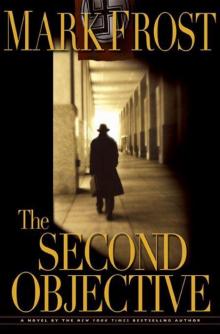 The Second Objective
The Second Objective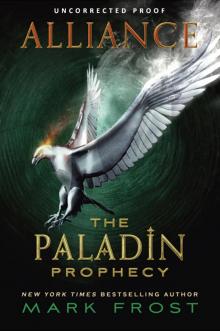 Alliance
Alliance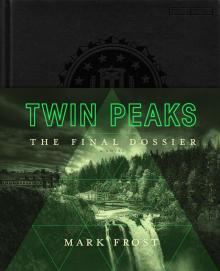 Twin Peaks: The Final Dossier
Twin Peaks: The Final Dossier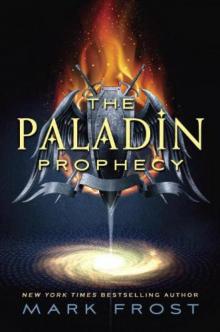 The Paladin Prophecy
The Paladin Prophecy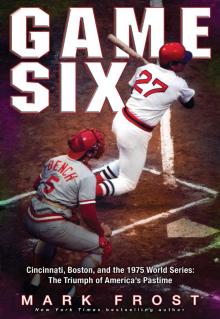 Game Six: Cincinnati, Boston, and the 1975 World Series: The Triumph of America's Pastime
Game Six: Cincinnati, Boston, and the 1975 World Series: The Triumph of America's Pastime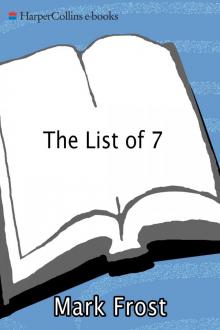 The List of Seven
The List of Seven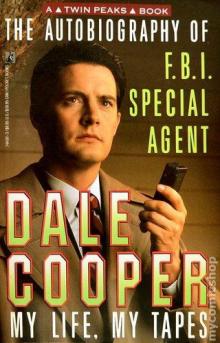 The Autobiography of FBI Special Agent Dale Cooper
The Autobiography of FBI Special Agent Dale Cooper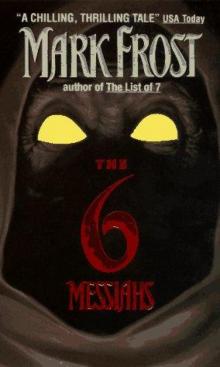 The Six Messiahs
The Six Messiahs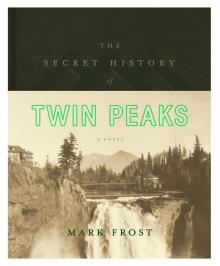 The Secret History of Twin Peaks
The Secret History of Twin Peaks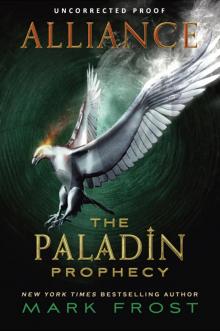 Paladin Prophecy 2: Alliance
Paladin Prophecy 2: Alliance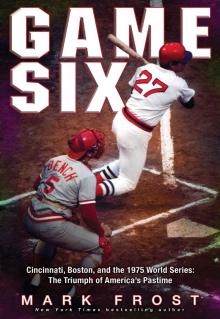 Game Six
Game Six